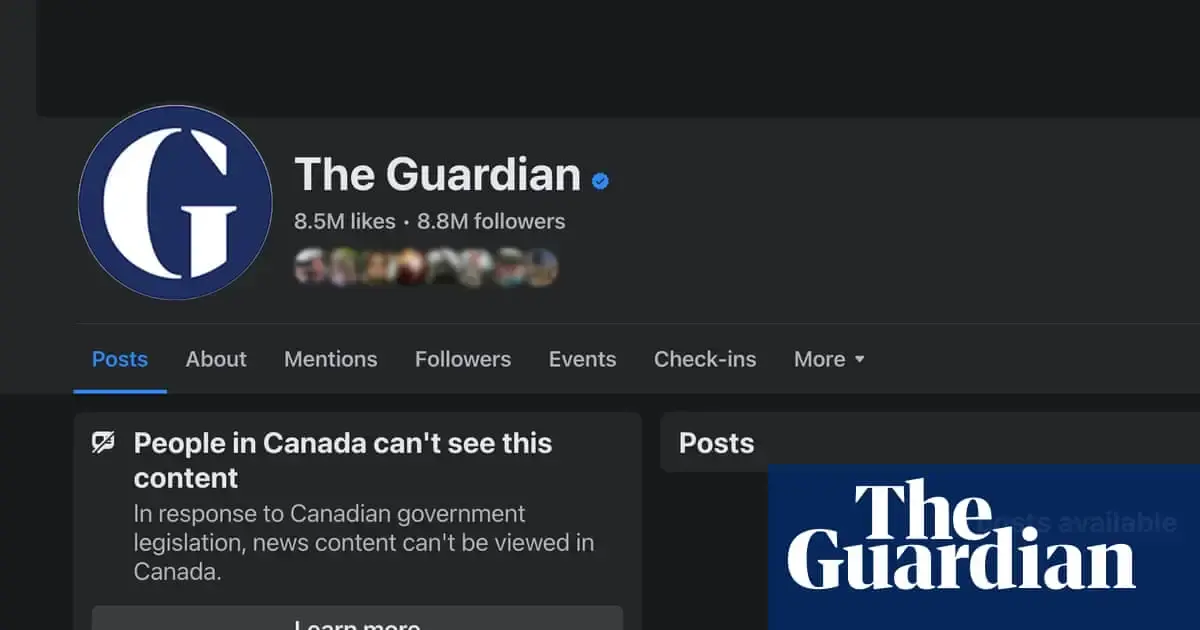
Facebook et al want the advertising dollars without any of the costs of reportage. This is a ham-fisted attempt to rectify the situation. I’m fine with it.
The government should up the ante by making Facebook “publishers” under the law. Make them responsible for all of the libel, slander and defamation posted to their sites. Make them responsible for their lack of moderation, and the fallout it’s been causing.

Yeah and so do the companies that are lining up at the feeding trough. Look at the pathetic state of the Canadian newspaper and TV news empires. They shouldn’t be entitled to advertising dollars if they don’t have a sufficiently enticing product to sell to advertisers.
Plenty of small-scale and digital independent news companies were doing fine. It’s the Postmedias and the Torstars that are complaining, as they cannibalize journalism to feed their corporate acquisitions and stock buybacks.

Boycott Zuckerberg. Boycott Billionaires.

The most watched/heard Canadian media has a number of billionaires behind it, though. By extension, we should boycott the biggest corporate media conglomerates as well.

One single anti-democracy RW US billionaire having control over what Canadians see is unacceptable. Do whatever else you want.

Create a law that singles out specific players in a monopoly to pay other players in a falling monopoly (look who owns nearly all news media in Canada).
Make the law NOT about summarizing and ad funding but about linking which is fundamental to how the internet works and how all sites get found.
Facebook / Google links to Canadian news isn’t valuable enough to them for the hassle so they turn them off, it really was the expected outcome.

I’m no big fan of the tech monopolies but this whole Liberal thing has been so fucking Liberal, it’s like a parable.

How exactly did our democracy manage, between 1867 and whenever the fuck Facebook came by?

There’s been too many articles about how bad it is that Meta and Google are going to stop carrying news, and not nearly enough on how to find news without Meta and Google. And, really, C-18 kind of disincentivizes news sites bringing up alternatives since the point was to get news sites paid, and Meta’s and Google’s competitors won’t have to pay them.

If you can’t find the news without an algorithm you won’t understand it anyway and I don’t mind if don’t take part in any elections.

Canadian here. I think the law is stupid. It’s literally free advertising. I use Google News to see a bunch of local and national news sources in one spot. I only see the article headlines. If I want to see anything, I have to click and go to the full article. The news companies aren’t paying anything to get aggregated and they get free traffic to their site.
In regards to the quoting pieces of the article they’re linking to in search results, the brief snippets they provide often have barely any information at all or cut off before the information you want to see, so you have to click on the results anyway.
Our government is just inept when it comes to the internet.

Indeed. The hyper-consolidated legacy media empires were unsatisfied with the free advertising they were getting and convinced Pablo Rodriguez and the Liberals that they should in fact be paid for visibility they were being given.

They want what Australia has. Sure the law in Australia might not have worked exactly as written but the News outlets still got paid and have deals with Facebook. And that’s all that they wanted. I’m guessing they’ll take a harder stance on Canada to stop other countries from trying it.

The question of who gets to decide and what is and isn’t a “News outlet” is seriously problematic. I also think that journalists ought to maintain an adversarial posture towards government and now we’re creating a system in which “approved” journalists are dependent upon official recognition to receive legislated funding.
This is the best summary I could come up with:
The policy came in retaliation for a new law, the Online News Act, created in an effort to help shore up revenue at Canadian journalism outlets by forcing intermediaries such as Meta and Google’s parent company Alphabet to chip in.
The company has described the legislation, Bill C-18 – passed on 18 June – as “unworkable” and argued that the only way to comply with the law is to “end news availability for people in Canada”.
Timothy Caulfield, a University of Alberta professor who researches health and science misinformation, said that even before the passage of the new law, social media and online forums were a dominant force in spreading unproven therapies and conspiracy theories about conventional medicine.
But Ahmed Al-Rawi, the head of the Disinformation Project at Simon Fraser University, said limiting news access on social media platforms like Facebook and Instagram compromises those investments.
Al-Rawi also said the inability to link to news could lead more people to share screenshots, which are easy to doctor using image-editing software or AI technologies.
Al-Rawi also noted that Canada’s federal parties – including the ruling Liberals, the architects of C-18 – are still spending on Facebook ads, even after the bill’s passage.
I’m a bot and I’m open source!

¯\_( ͡° ͜ʖ ͡°)_/¯

